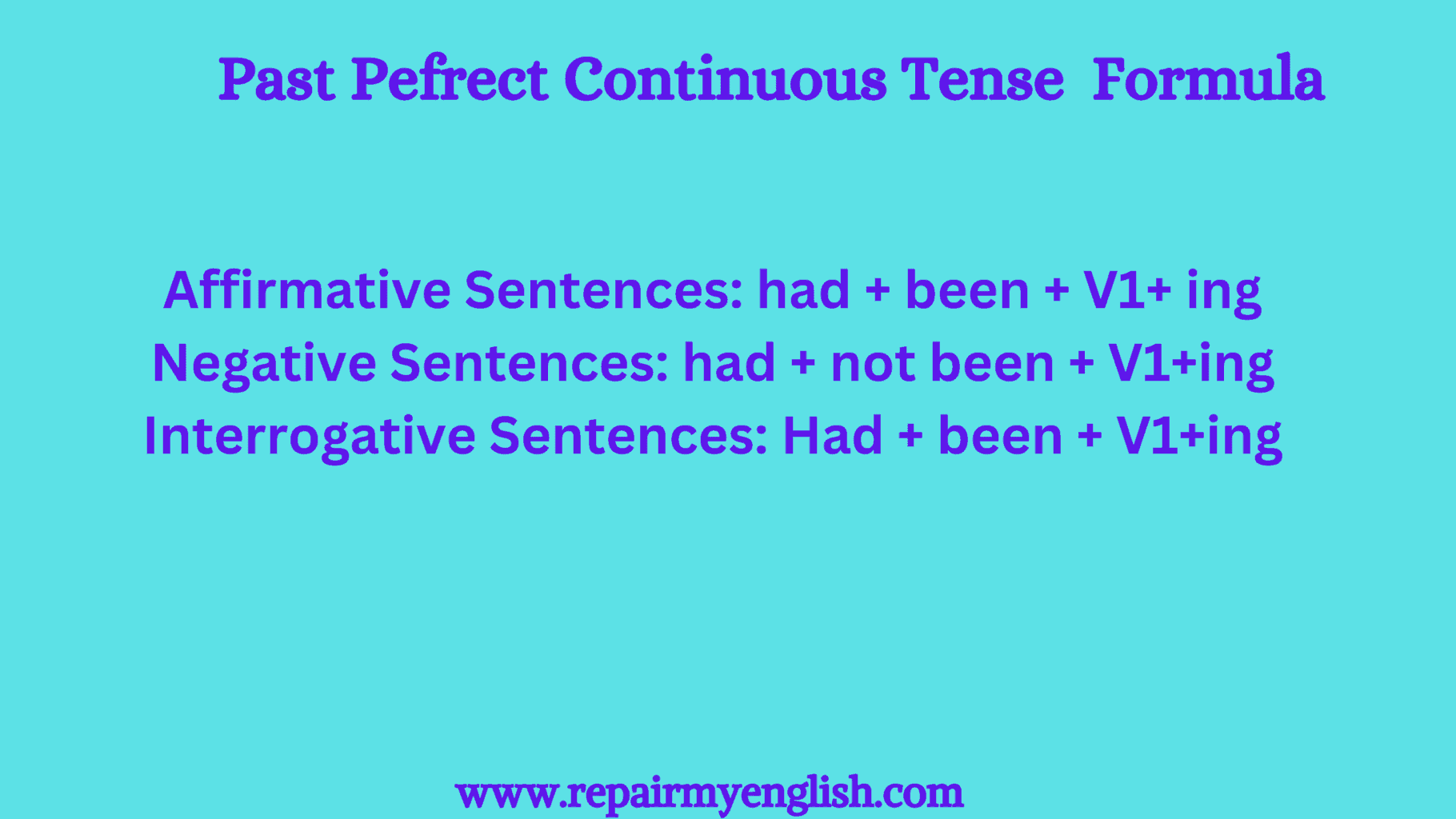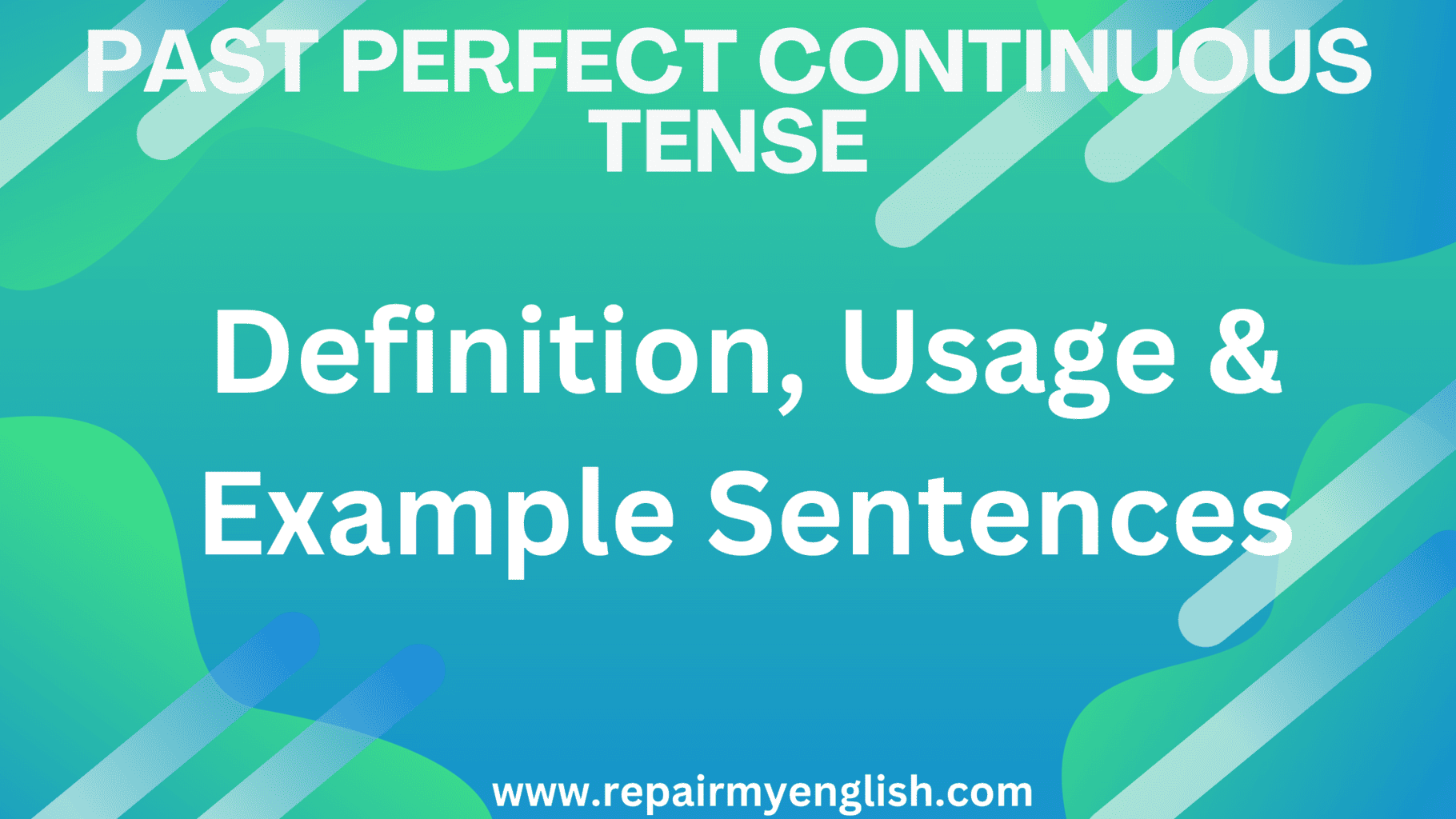Past Perfect Continuous Tense:
The Past Perfect Continuous Tense is a grammatical tense used to describe actions or events that were ongoing and had been happening for a period in the past, up to a specific point in the past. It is a combination of the past tense, the perfect aspect, and the continuous aspect.

Past Perfect Continuous Rule:
Subject + Had + Been + Present Participle of the Main Verb + Object
Example: She had been working all day.
The past perfect continuous tense is often used with time expressions such as “for,” “since,” and “how long” to indicate the duration of the action.
Example: They had been studying for three hours before the exam.
First-person singular | I + had been |
I + had +been + verb + ing | I + had + been + working |
Second-person singular | You + had been |
You + had +been + verb + ing | You + had + been+ working |
Third-person singular | He / She / It + had been |
He + had + been + verb + ing | He + had+ been + working |
She +had + been + verb + ing | She + had+ been + working |
It + had + been+ verb + ing | It + had + been + working |
First-person plural | We + had been |
We + had + been+ verb + ing | We + had + been + work + ing |
Second-person plural | You + had been |
You + had + been + verb + ing | You + had + been+ work + ing |
Third-person plural | They + had been |
They + had+ been+ work + ing | They + had + been+ work + ing |
Past Perfect Continuous Tense Usage:
- Duration in the Past: This tense is used to describe an action that started in the past and continued up to a certain point in the past. It highlights how long the action lasts.
Example: He had been reading the book for two hours before he fell asleep.
- Cause and Effect in the Past: It can be used to explain why something happened in the past by showing that one action was ongoing when another action occurred.
Example: She was tired because she had been working all night.
Past Perfect Continuous Tense Example Sentences:
- By the time we arrived, they had been waiting for us for ages.
- They were exhausted because they had been hiking in the mountains all day.
- I had a sore throat because I had been singing at the concert.
- How long had you been studying before you took the test?
Past Perfect Continuous Tense Affirmative Example Sentences :
- I had been writing articles on the topic of Marketing for two hours.
- He had been reading Rabindranath’s poetry since morning.
- Mansi had been gossiping with the tailor for two hours.
- I had been dancing on folk songs for an hour.
- Her parents had been travelling around the world since January.
Past Perfect Continuous Tense Negative Example Sentences :
Rule: Subject + had + not + been + V1 + ing + Object + for/since
- Affirmative: I had been writing articles on the topic of Marketing for two hours.
- Negative: I had not been writing articles on the topic of Marketing for two hours.
- Affirmative: He had been reading Rabindranath’s poetry since morning.
- Negative: He had not been reading Rabindranath’s poetry since morning.
- Affirmative: Mansi had been gossiping with the tailor for two hours.
- Negative: Mansi had not been gossiping with the tailor for two hours.
- Affirmative: I had been dancing on folk songs for an hour.
- Negative: I had not been dancing on folk songs for an hour.
- Affirmative: Her parents had been travelling around the world since January.
- Negative: Her parents had not been travelling around the world since January.
Past Perfect Continuous Tense Interrogative Example Sentences:
Rule: Had + Subject + been + V1 + ing + Object + for/since
- Affirmative: I had been writing articles on the topic of Marketing for two hours.
- Negative: I had not been writing articles on the topic of Marketing for two hours.
- Interrogative: Had I been writing articles on the topic of Marketing for two hours?
- Affirmative: He had been reading Rabindranath’s poetry since morning.
- Negative: He had not been reading Rabindranath’s poetry since morning.
- Interrogative: Had he been reading Rabindranath’s poetry since morning?
- Affirmative: Mansi had been gossiping with the tailor for two hours.
- Negative: Mansi had not been gossiping with the tailor for two hours.
- Interrogative: Had Mansi been gossiping with the tailor for two hours?
- Affirmative: I had been dancing on folk songs for an hour.
- Negative: I had not been dancing on folk songs for an hour.
- Interrogative: Had I been dancing on folk songs for an hour?
- Affirmative: Her parents had been travelling around the world since January.
- Negative: Her parents had not been travelling around the world since January.
- Interrogative: Had her parents been travelling around the world since January?
Conclusion:
The Past Perfect Continuous Tense is a useful tool in English grammar for describing actions or events that were ongoing and had a duration in the past. It helps to convey the idea of how long an action had been happening before something else occurred or before a specific point in the past.
For More topics visit our Grammar Page.
Related topics:

